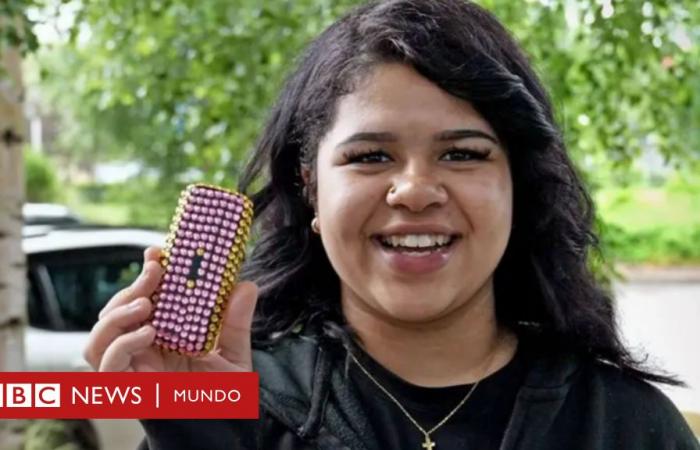Image source, Getty Images
- Author, Drafting
- Role, BBC News World
-
June 17, 2024, 09:30 GMT
Most parents with teenagers share one concern: the amount of time they spend on their smartphones.
There is no doubt that telephones are a fundamental tool of modern life with which young people communicate, make inquiries, coordinate their chores and in some countries pay for all kinds of things, from transportation to a soft drink.
But the increasing number of hours spent staring at the device screen, particularly browsing social networks, shows that technology has become an obsession.
Part of that obsession manifests itself in the “fear of missing out” or FOMO, as it is known by its English acronym. It’s the anxiety that something interesting or exciting is happening somewhere on the internet that I can’t miss.
According to a study by Harvard University, in the United States, the use of social networks and other platforms stimulates the same region of the brain that is activated when taking an addictive substance.
As part of a BBC project analyzing the habits of young people with their smartphones, 10 students from the Media City University Technical College, in Salford, England, agreed to change their smartphones for basic Nokia devices, which are only useful for doing things. calls and send text messages.
The five-day duration of the program “technological detox” They would undoubtedly affect almost every aspect of their lives; This generation has grown up with smartphones and uses the internet for everything. They communicate mainly through Snapchat or Facetime, use Google Maps to get around and constantly listen to music on streaming.
BBC investigative journalist Kristian Johnson monitored some of the participants and this is what he found:
Will spends more than eight hours a day looking at his smartphone. When he was younger, he loved riding his bike, but now he spends most of his free time after school watching TikTok videos.
Last week, Will logged 31 hours on social media apps alone and his biggest concern was how he would survive the five days of technological withdrawal. “Now I’ll have to socialize with my parents,” she said.
More on Will later.
Image source, Getty Images
“Positive impact”
Ruby dreams of being an actress. She admits that she spends too much time on her phone and frequently ignores her parents while she scrolls through TikTok videos.
Halfway through the experiment, I visited his family.
When I arrived, the 15-year-old was finishing up her makeup before leaving for class.
Her father makes sure she has her work uniform in her backpack and then her mother drives her to the tram stop.
Ruby acknowledges that stopping using his smartphone “has opened up the conversation more” with his parents; Her mother, Emma, agrees that detox is having a positive impact on her daughter’s behavior.
“Ruby is very addicted to her phone, so it gives her a chance to see what things were like when I was a teenager,” says Emma.
“He’s talking more and going to bed earlier. “It’s a good change.”
As we approach the station, we can see that the tram is already moving away.
Out of habit, Ruby would check an app on her phone to find out when the next tram would arrive. Reading the schedules on the stop boards is not something this generation does.
“Without a phone, I have no way of knowing,” he says.
Image source, BBC / Kristian Johnson
While we wait for the next tram, Ruby tells me about her part-time job at a foam projectile play center. She works a few days a week, but she’s not sure if she has a shift later that day, nor how long the shift will be.
Her manager gave her his phone number in case she needed to confirm her schedule, but she feels “a little nervous” about having to call.
“The app shows you your turn, but I don’t know that anymore,” explains Ruby. “I never call work, ever.”
He pays the tram fare with a card that he rarely used since he now You can no longer do it with your digital walletand we begin the one-hour journey.
FOMO Distress
For some teenagers it has been really difficult to let go of their smartphones.
After just 27 hours, Charlie, 14, abandoned the experiment and asked for his device back.
“I knew my phone was in the same building,” he notes, but not knowing if someone was trying to contact him and not being able to stay connected was “really stressful.”
Another thing that seems to have distressed all the participants in the experiment is the status of their snapstreakwhich counts the days they have exchanged messages with someone on Snapchat.
Some participants say they are very worried about losing the chain, which can sometimes extend to more than 1,000 consecutive days. So they have asked their friends to log into their accounts to keep their snapstreaks during the detox period.
Like Charlie, other students participating in the experiment admit to suffering from FOMO, but most express surprise at how liberating they find the experience.
Some are sleeping better, they say, while others feel they have been more productive without their phones.
“I feel like I’m learning things and getting more involved, I don’t feel like I’m missing out,” says Grace, 15.
Image source, BBC / Kristian Johnson
Immediately after classes, on the first day of the experiment, she and her friends went shopping plastic jewelry to “decorate” your basic phone which is shaped like a brick.
When she shows it to me during our conversation, Grace says that shopping was a good distraction to not think about your smartphone.
“It was really calm,” he says. “I really enjoyed it because it activated my creative flow again.”
“As soon as I returned home, I started drawing things and painting. She helped me start doing the things I like again.”
Survey
In February, the British government published new guidelines to try to prevent students from using phones during the school day.
But a cross-party group of parliamentarians went further and proposed in May that a total veto -not just at school- to smartphones for everyone under 16 years of age.
In a survey of 2,000 young people aged 13 to 18 conducted by BBC Radio 5 and the BBC Bitesize website, participants were asked about various aspects of their lives, including their mental health and smartphone habits.
The survey was conducted by the survey company Survation and this is what they found:
- 23% agrees that smartphones should be prohibited for those under 16 years of age
- 35% believes that social networks should be prohibited to those under 16 years of age
- 50% says not having their smartphones makes them anxious. Last year the figure was slightly higher (56%).
Image source, BBC / Kristian Johnson
Simply engaging in this digital detox has set these teens apart from their contemporaries. In the BBC poll, 74% of young people surveyed said that They wouldn’t consider trading in their smartphones for a basic device..
After five long days, it was time to reunite the students with their smartphones.
Excitement levels rise as one of the teachers walks to the safe to get them out. Several students shout with excitement.
As soon as they turn on their devices, teens are glued to their screens, swiping messages and updating themselves in group chats.
But most say that after participating in detox, They would like to find ways to limit the time they spend on their phones.
“It’s made me realize how much time I waste on social media and I realize I need to cut back on it and go out more,” Will admits. “I’ll try to use less TikTok, that’s for sure.”
He accepts it is difficult and says he particularly missed listening to music. However, the time he has spent away from his phone has allowed him to reconnect with his passion for cycling, something he is determined to continue, rather than spending endless hours on the screen.”
“Eight hours a day is crazy,” he reflects.
And remember that you can receive notifications in our app. Download the latest version and activate them.






